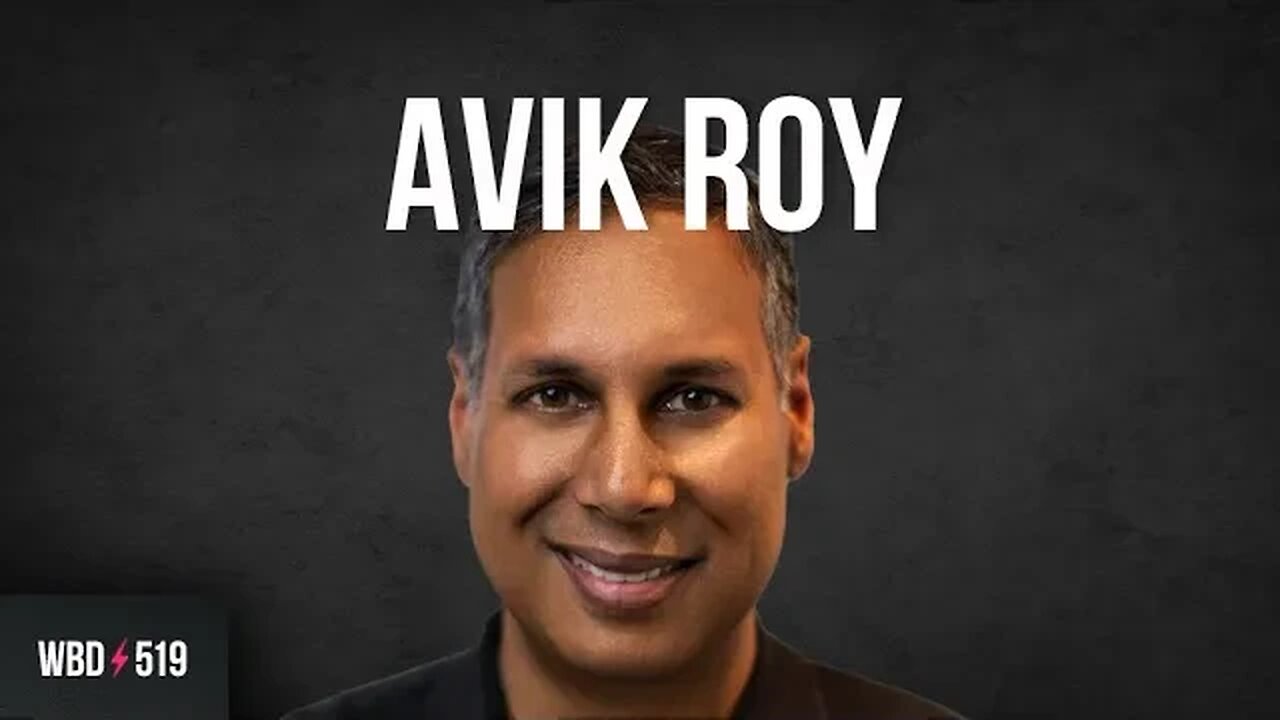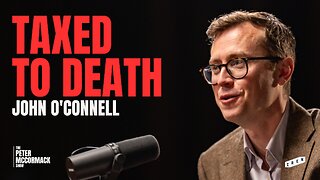Premium Only Content

Inflation’s Hidden Cost with Avik Roy
SHOW NOTES:
https://www.whatbitcoindid.com/podcast/inflations-hidden-cost
Avik Roy is president of the Foundation for Research on Equal Opportunity think tank and a policy Editor at Forbes. In this interview, we discuss the Lummis Gillibrand Responsible Financial Innovation Act, inflation’s compounding impact on the poor and why Bitcoin provides optimism.
THIS EPISODE’S SPONSORS:
Gemini - https://www.gemini.com/
Cake Wallet - https://cakewallet.com/
BlockFi - https://blockfi.com/peter
Casa - https://keys.casa/?pk_campaign=wbd-yearly-sponsor&pk_medium=sponsorship&pk_source=what-bitcoin-did
Ledger - https://www.ledger.com/
Compass Mining - https://compassmining.io/
BCB Group - https://hubs.ly/Q011cb730
TIMESTAMPS:
00:00:00 Introduction
00:02:04 FREOPP
00:08:01 Lummis Gillibrand Responsible Financial Innovation Act
00:24:50 Securities, ancillary assets and commodities
00:31:22 Process for passing legislation
00:37:10 Inflation’s compounding impact on the poor
00:53:07 Cost of living crisis, FED bubble, wages
01:05:13 Is inflation necessary; near-term vs long-term inflation
01:15:55 Should the poorer in society buy Bitcoin?
01:22:45 Impact of inflation inequality; reasons to be optimistic
WHERE TO FIND THE SHOW:
→ My website: https://www.whatbitcoindid.com/podcast/
→ iTunes: https://apple.co/2OOlzVV
→ Spotify: https://spoti.fi/2ygc4W1
→ Stitcher: https://bit.ly/2IQO8fX
→ SoundCloud: https://bit.ly/2CGSVQR
→ YouTube: https://bit.ly/3nyi9Ez
→ TuneIn: https://bit.ly/2ywystr
LISTEN TO OLD EPISODES:
→ By guest: https://www.whatbitcoindid.com/guests/
→ By topic: https://www.whatbitcoindid.com/topics/
→ Transcriptions: https://www.whatbitcoindid.com/transcriptions/
SUPPORT THE SHOW:
→ https://www.whatbitcoindid.com/sponsorship/
→ Become a Patron: https://www.patreon.com/whatbitcoindid/
→ Subscribe on iTunes
→ Leave a review on iTunes
→ Share the show out with your friends and family on social media
→ Drop me a line on hello@whatbitcoindid.com
WHERE TO FOLLOW ME:
→ Twitter: https://twitter.com/whatbitcoindid/
→ Medium: https://medium.com/@whatbitcoindid/
→ Instagram: http://instagram.com/whatbitcoindid/
→ Facebook: https://www.facebook.com/whatbitcoindid/
→ YouTube: https://www.youtube.com/whatbitcoindidpodcast
→ Website: https://www.whatbitcoindid.com/
→ Email list: https://www.whatbitcoindid.com/subscribe/
LEARN ABOUT BITCOIN:
→ Step by Step Guide: https://www.whatbitcoindid.com/beginners-guide
→ Training: https://www.whatbitcoindid.com/training/
→ Resources: https://www.whatbitcoindid.com/resources/
#Bitcoin #Finance #Economics
****
“A lot of people, particularly intellectuals, like to complain about our consumerist culture in America. Well, what creates a consumerist culture? A monetary policy that destroys the long-term value and reward for saving your own money.”
— Avik Roy
Avik Roy is president of the Foundation for Research on Equal Opportunity think tank and a policy Editor at Forbes. In this interview, we discuss the Lummis Gillibrand Responsible Financial Innovation Act, inflation’s compounding impact on the poor and why Bitcoin provides optimism.
- - - -
On June 7th Republican Senator Lummis and Democratic Senator Gillibrand introduced the Responsible Financial Innovation Act, which aims to establish a regulatory framework for digital assets in the US. Many Bitcoiners believe Bitcoin is designed to work outside of regulatory oversight. But is this proposal inimical to Bitcoin’s potential to positively contribute to society?
If Bitcoin is to play a dominant role within society, can it do that outside of the law? Irrespective of Bitcoin, should governments have a role in protecting citizens from the negative impacts of the wider altcoin market? What are the dividing lines between different digital assets? And, could the lack of regulation in the near term actually be detrimental to Bitcoin in the long run?
Bitcoin’s advocates are heavily engaged in trying to obtain regulatory clarity - they fear continued uncertainty could delay or damage its ability to provide utility to those who really need it. This is particularly for those impacted by the ravages of inflation.
The current inflationary environment has resulted in renewed consideration of this economic condition. The issue is that there is actually a deficit of understanding of inflation’s regressive impacts. It impacts the poorest in society hardest, whilst benefiting the richest. These impacts compound over time such that inequality explodes even in low inflationary environments.
Does this mean inflation as a policy is a busted flush? Should economies aim for zero inflation? These are radical policy shifts that are unlikely to happen anytime soon. This is why Bitcoin provides some with optimism: it’s trying to be the hardest money the world has ever seen.
-
 1:18:25
1:18:25
The Peter McCormack Show
19 days agoWe're £12 Trillion in Debt | John O'Connell x Peter McCormack Show
671 -
 27:11
27:11
World2Briggs
15 hours ago $3.47 earnedI Went To The Protest Capital Of The United States
36.8K11 -
 6:13
6:13
scoutthedoggie
20 hours agoClose-Quarters Airsoft gameplay Scotland 2025
27.3K2 -
 5:08
5:08
The Shannon Joy Show
15 hours agoDr. David Martin: Bio-Terror SHOCKER! Is The Pentagon Planning Another Crisis On July 4?
33.6K3 -
 10:04
10:04
VSOGunChannel
17 hours ago $1.40 earned2nd Amendment Civil Rights Task Force: Gun Grabber Nightmare? or More Wind?
25.5K4 -
 3:28
3:28
The Official Steve Harvey
17 hours ago $2.09 earnedThe Funniest 😂 & Cheesiest 🧀 Pickup Lines Ever! I Steve Harvey
29.1K2 -
 LIVE
LIVE
SPLASH Fashion Tv
4 days ago $19.41 earnedBIKINI WATCH PARTY 31: Miami Play Things / Best of Miami Swim Week
2,805 watching -
 1:01:10
1:01:10
Mike Rowe
4 days agoPETA Is NOT Gonna Like This… | Peggy Rowe #433 | Coffee With Mom
53.3K76 -
 20:05
20:05
Stephen Gardner
18 hours ago🔥Omar SPREADS DANGEROUS lie as Trump makes SHOCK ANNOUNCEMENT!
41K171 -
 2:21:56
2:21:56
Badlands Media
18 hours agoBaseless Conspiracies Ep. 131
90K26